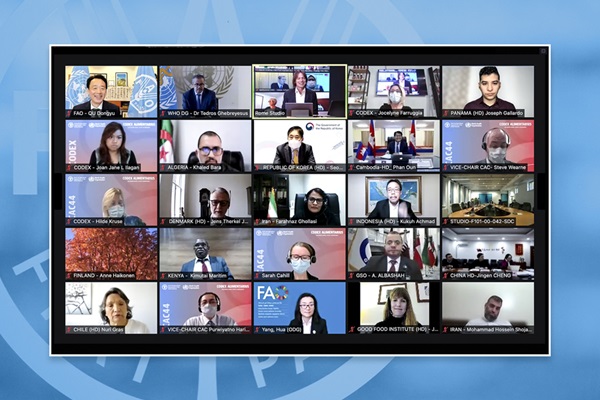
Rome - The Director-General of the Food and Agriculture Organization of the United Nations (FAO), QU Dongyu, today hailed the Codex Alimentarius’ food standards for laying a strong foundation to ensure the foods that we grow, produce, process, trade and consume are safe.
Qu addressed the opening of the 44th session of the Codex Alimentarius Commission, the United Nations body established by FAO and the World Health Organization (WHO) to protect consumer health and ensure fair practices in international food trade.
He noted that “when doubts emerged about the risks from COVID-19 in food, FAO together with the World Health Organization (WHO), through Codex, provided quick, professional and technical guidance to producers, businesses and consumers.”
“Working collectively and in an integrated manner is vital, and Codex is a leading example of the power of effective and efficient partnerships,” Qu told the more than 800 participants in the virtual conference.
The Director-General of the World Health Organization, Tedros Adhanom Ghebreyesus emphasized the critical role that Codex standards play in improving the safety and quality of food, protecting and promoting consumers’ health and nutrition, and protecting fair trade practices.
He praised the increasing synergies between FAO and WHO with the alignment of both agencies’ food safety strategies, and their deepening partnership to fight antimicrobial resistance.
Codex’s use of technology and innovation
The FAO Director-General underscored that by harnessing the latest technology, Codex continues to be the global platform to develop food safety and quality standards that protect consumers and facilitate good practices in food trade.
He pointed to Codex’s work on electronic certification and third-party assurance which will contribute to making trade documentation more efficient and secure, and setting the benchmark for food safety in global food market.
The 44th session of the Codex Alimentarius Commission will be held online from 8 to 18 November 2021 with members expected to approve a series of standards, guidelines and codes of practice.
Codex Committees and Task Forces have met virtually in 2021 to complete work on a range of standards which have been proposed for adoption by the Commission:
During its 44th session the Commission will also examine the possible need and mechanism for Codex to address and provide guidance on new food sources and production systems (e.g. microalgae, cell culture based food products, 3D printed foods, etc.), and review the updates of the FAO Food Safety Strategy 2022-2031 and WHO Global Strategy for Food Safety 2022-2030 .
About Codex
Established in 1963 by the Food and Agriculture Organization of the United Nations (FAO) and World Health Organization (WHO), the Codex Alimentarius Commission is the UN food standards body charged with protecting consumer health and ensuring fair practices in international food trade.
Comprising 189 Members and 240 observer organizations, the Codex Alimentarius Commission meets annually to adopt food safety and quality standards and related recommendations.